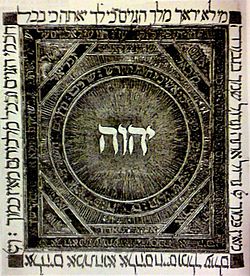유대교의 신: 두 판 사이의 차이
내용 삭제됨 내용 추가됨
잔글 봇: 전거 통제 틀 추가 |
잔글 깨진 각주 수정 태그: 동음이의 링크 |
||
| 14번째 줄: | 14번째 줄: | ||
중세의 [[유대인]] 토라 학자 [[마이모니데스| 람밤]]은 [[야훼| 하쉠]]에 대해 다소 세부적으로 묘사했다 |
중세의 [[유대인]] 토라 학자 [[마이모니데스| 람밤]]은 [[야훼| 하쉠]]에 대해 다소 세부적으로 묘사했다 |
||
Maimonides는 [[이븐 시나|Avicenna]] 의 신이 무소 [[전재|부재]] 하고 무형적이며<ref name="Lebens 2022" /> [[세계의 영원|우주]] 창조를 위해 [[부동의 동자|필연적으로]] 존재하는 [[부동의 동자|신에 대한 개념을 확인했으며, 동시에 아리스토텔레스의]] 신이 움직이지 않는 운동자라는 개념을 거부했습니다.<ref name="Lebens 2022" /> 유대교에 대한 전통적인 해석은 일반적으로 신이 인격적 이면서도 초월적이며 세상에 개입할 수 있다는 점을 강조하는 반면<ref name="Ben-Sasson 2018" /> 유대교에 대한 일부 현대적 해석은 신이 우주와 관련된 초자연적 존재가 아니라 비인격적인 힘 또는 이상이라고 강조합니다.<ref name="Tuling 2020" /><ref name="Berlin 2011" /> |
Maimonides는 [[이븐 시나|Avicenna]] 의 신이 무소 [[전재|부재]] 하고 무형적이며<ref name="Lebens 2022">{{서적 인용|author-last=Lebens |author-first=Samuel |year=2022 |chapter=Is God a Person? Maimonidean and Neo-Maimonidean Perspectives |chapter-url=https://books.google.com/books?id=wYlUEAAAQBAJ&pg=PT90 |editor1-last=Kittle |editor1-first=Simon |editor2-last=Gasser |editor2-first=Georg |title=The Divine Nature: Personal and A-Personal Perspectives |location=[[London]] and [[New York City|New York]] |publisher=[[Routledge]] |edition=1st |pages=90–95 |doi=10.4324/9781003111436 |isbn=978-0-367-61926-8 |s2cid=245169096 |lccn=2021038406}}</ref> [[세계의 영원|우주]] 창조를 위해 [[부동의 동자|필연적으로]] 존재하는 [[부동의 동자|신에 대한 개념을 확인했으며, 동시에 아리스토텔레스의]] 신이 움직이지 않는 운동자라는 개념을 거부했습니다.<ref name="Lebens 2022" /> 유대교에 대한 전통적인 해석은 일반적으로 신이 인격적 이면서도 초월적이며 세상에 개입할 수 있다는 점을 강조하는 반면<ref name="Ben-Sasson 2018">{{서적 인용|author-last=Ben-Sasson |author-first=Hillel |year=2018 |chapter=Conditional Presence: The Meaning of the Name YHWH in the Bible |chapter-url=https://books.google.com/books?id=XKjDDwAAQBAJ&pg=PA25 |title=Understanding YHWH: The Name of God in Biblical, Rabbinic, and Medieval Jewish Thought |location=[[Basingstoke]] and [[New York City|New York]] |publisher=[[Palgrave Macmillan]] |edition=1st |series=Jewish Thought and Philosophy |pages=25–63 |doi=10.1007/978-3-030-32312-7_2 |isbn=978-3-030-32312-7|s2cid=213883058 }}</ref> 유대교에 대한 일부 현대적 해석은 신이 우주와 관련된 초자연적 존재가 아니라 비인격적인 힘 또는 이상이라고 강조합니다.<ref name="Tuling 2020">{{서적 인용|author-last=Tuling |author-first=Kari H. |year=2020 |chapter=PART 2: Does God Have a Personality—or Is God an Impersonal Force? |chapter-url=https://books.google.com/books?id=EzfsDwAAQBAJ&pg=PA67 |editor-last=Tuling |editor-first=Kari H. |title=Thinking about God: Jewish Views |location=[[Lincoln, Nebraska|Lincoln]] and [[Philadelphia]] |publisher=[[University of Nebraska Press]]/[[Jewish Publication Society]] |series=JPS Essential Judaism Series |pages=67–168 |doi=10.2307/j.ctv13796z1.7 |isbn=978-0-8276-1848-0 |s2cid=241520845 |lccn=2019042781}}</ref><ref name="Berlin 2011">{{서적 인용|author1-last=Grossman |author1-first=Maxine |author2-last=Sommer |author2-first=Benjamin D. |year=2011 |chapter=GOD |chapter-url=https://books.google.com/books?id=hKAaJXvUaUoC&pg=PA294 |editor-last=Berlin |editor-first=Adele |editor-link=Adele Berlin |title=The Oxford Dictionary of the Jewish Religion |location=[[Oxford]] and [[New York City|New York]] |publisher=[[Oxford University Press]] |edition=2nd |pages=294–297 |doi=10.1093/acref/9780199730049.001.0001 |isbn=978-0-19-975927-9 |lccn=2010035774}}</ref> |
||
{{전거 통제}} |
{{전거 통제}} |
||
[[분류:신적 개념]] |
[[분류:신적 개념]] |
||
2023년 8월 13일 (일) 11:52 판
이 문서는 위키백과의 편집 지침에 맞춰 다듬어야 합니다. (2023년 7월 22일) |
이 문서는 자연스럽지 않게 번역되었으며, 기계 번역을 통해 작성되었을 수도 있습니다. (2023년 7월) |

| 유대교 |
|---|
 |
유대교의 하느님은 유대교의 하느님은 다양한 방식으로 전해져 왔다.
유대교에서는 하쉠은 아브라함, 이쯔학크, 야아코브의 엘로킴이며 이쓰라엘의 주인으로 이쓰라엘은 그의 종이라 주장한다. 유대인들은 하쉠은 자신들을 미쯔라임의 노예 생활에서 해방시켜 준 자이며 또한 토라에 기록된 것과 같이 하쉠의 예언자인 모셰를 통애이쓰라엘에게 기록 토라와 구전 토라를 그들에게 주었다고 주장한다.
유대교는 그가 유일한 신이며 그 외에는 또 다른 신이 없고, 또한 그가 시간과 공간, 물질적 우주와 추상적 개념을 완벽히초월한 존재라 말한다.
하쉠은 유일무이하고 완벽하며 모든 허물과 결핍과 결함이 없으며, 더 나아가 전지전능하며, 그의 모든 시간과장소에서 존재하는 모든 것의 유일한 창조주로 말해진다.
유대교는 하쉠이 어떤 형상이나 모습을 가지고 있지 않다고 가르치며, 그저 사람이 단순 재미로 '하쉠은 어떤 몸을 가지고 있을까?'와 같은 생각을 하는 것 조차도 할락하적으로 금기이다.
중세의 유대인 토라 학자 람밤은 하쉠에 대해 다소 세부적으로 묘사했다
Maimonides는 Avicenna 의 신이 무소 부재 하고 무형적이며[1] 우주 창조를 위해 필연적으로 존재하는 신에 대한 개념을 확인했으며, 동시에 아리스토텔레스의 신이 움직이지 않는 운동자라는 개념을 거부했습니다.[1] 유대교에 대한 전통적인 해석은 일반적으로 신이 인격적 이면서도 초월적이며 세상에 개입할 수 있다는 점을 강조하는 반면[2] 유대교에 대한 일부 현대적 해석은 신이 우주와 관련된 초자연적 존재가 아니라 비인격적인 힘 또는 이상이라고 강조합니다.[3][4]
- ↑ 가 나 Lebens, Samuel (2022). 〈Is God a Person? Maimonidean and Neo-Maimonidean Perspectives〉. Kittle, Simon; Gasser, Georg. 《The Divine Nature: Personal and A-Personal Perspectives》 1판. London and New York: Routledge. 90–95쪽. doi:10.4324/9781003111436. ISBN 978-0-367-61926-8. LCCN 2021038406. S2CID 245169096.
- ↑ Ben-Sasson, Hillel (2018). 〈Conditional Presence: The Meaning of the Name YHWH in the Bible〉. 《Understanding YHWH: The Name of God in Biblical, Rabbinic, and Medieval Jewish Thought》. Jewish Thought and Philosophy 1판. Basingstoke and New York: Palgrave Macmillan. 25–63쪽. doi:10.1007/978-3-030-32312-7_2. ISBN 978-3-030-32312-7. S2CID 213883058.
- ↑ Tuling, Kari H. (2020). 〈PART 2: Does God Have a Personality—or Is God an Impersonal Force?〉. Tuling, Kari H. 《Thinking about God: Jewish Views》. JPS Essential Judaism Series. Lincoln and Philadelphia: University of Nebraska Press/Jewish Publication Society. 67–168쪽. doi:10.2307/j.ctv13796z1.7. ISBN 978-0-8276-1848-0. LCCN 2019042781. S2CID 241520845.
- ↑ Grossman, Maxine; Sommer, Benjamin D. (2011). 〈GOD〉. Berlin, Adele. 《The Oxford Dictionary of the Jewish Religion》 2판. Oxford and New York: Oxford University Press. 294–297쪽. doi:10.1093/acref/9780199730049.001.0001. ISBN 978-0-19-975927-9. LCCN 2010035774.
